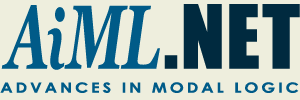AiML news 2003
August 31, 2003: Two RA positions available
Two RA positions are available at King's College London, Group of Logic, Language and Computation. One position is in the framework of the project Knowledge Representation and Reasoning about Distances (Funded by EPSRC, 2004-2007), another one in the framework of the project Dynamic Ontologies: a Framework for Services Descriptions (Funded by EPSRC, 2004-2007). More details about the first position may be found here, the second position is described here. The prospective applicants should contact Prof. Michael Zakharyaschev.
August 30, 2003: Conference on the logic of time and modality
Call for participation
Roskilde University
October 31 - November 1, 2003
http://www.philog.ruc.dk/phiconf3.html
Theme
Arthur Norman Prior (1914-69) was the founding father of the modern logic of time and modality. In the 1950s and 1960s he laid out the foundation of temporal logic and showed that this discipline was intimately connected with modal logic. Since then, temporal and modal logic has grown into a mature discipline with many important applications in philosophy, computer science, and also linguistics. It is the aim of the conference to discuss the modern challenges, problems, and applications of the Priorean approach to the logic of time and modality.
Program committee
Torben Braüner (Roskilde University),
Per Hasle (The University of Southern Denmark - Kolding),
Peter Øhrstrøm (Aalborg University)
Invited speakers
Patrick Blackburn (INRIA Lorraine),
Jack Copeland (University of Canterbury),
Kit Fine (New York University),
Antony Galton (University of Exeter),
Peter Simons (University of Leeds),
Heinrich Wansing (Dresden University of Technology),
Alberto Zanardo (University of Padova)
August 14, 2003: New book "Many-Dimensional Modal Logics: Theory and Applications", by D.M. Gabbay, A. Kurucz, F. Wolter, M. Zakharyaschev
![[D.M. Gabbay, A. Kurucz, F. Wolter, M. Zakharyaschev. Many-Dimensional Modal Logics: Theory and Applications]](../images/book-gkwz.gif)
To study the computational behaviour of many-dimensional modal logics is the main aim of this book. On the one hand, it is concerned with providing a solid mathematical foundation for this discipline, while on the other hand, it shows that many seemingly different applied many-dimensional systems (e.g., multi-agent systems, description logics with epistemic, temporal and dynamic operators, spatio-temporal logics, etc.) fit in perfectly with this theoretical framework, and so their computational behaviour can be analyzed using the developed machinery.
We start with concrete examples of applied one- and many-dimensional modal logics such as temporal, epistemic, dynamic, description, spatial logics, and various combinations of these. Then we develop a mathematical theory for handling a spectrum of 'abstract' combinations of modal logics - fusions and products of modal logics, fragments of first-order modal and temporal logics - focusing on three major problems: decidability, axiomatizability, and computational complexity. Besides the standard methods of modal logic, the technical toolkit includes the method of quasimodels, mosaics, tilings, reductions to monadic second-order logic, algebraic logic techniques. Finally, we apply the developed machinery and obtained results to three case studies from the field of knowledge representation and reasoning: temporal epistemic logics for reasoning about multi-agent systems, modalized description logics for dynamic ontologies, and spatio-temporal logics.
Readership: Logicians. Logicians in Computer Science (researchers and students). Researchers and students in knowledge representation and reasoning.
For more information and ordering see Elsevier page.
August 12, 2003: Augustus De Morgan Conference
The Fifth Augustus De Morgan Conference, "Knowledge Representation and the Reasoning Agent" to take place in The Great Hall, King's College London, between 3-5 November 2003, addresses the problems of knowledge representation, an essential component in logic modelling.
The topic for this year responds to the rising importance of knowledge representation and reasoning in various disciplines, in particular
- reasoning about agent's knowledge,
- legal representation and reasoning,
- analysis and assessment of legal evidence,
- logical reasoning and natural language,
- representation and parsing of grammatical structure,
- applications of KR&R to the Semantic Web.
Knowledge representation has played a crucial role in the development of artificial intelligence, and remains one of the strongest subfields of AI. From the earliest days of AI, leading researchers have argued that in order for a program to act intelligently, it must have sophisticated methods of representing and reasoning with knowledge. The contribution of KR research - e.g. the use of formal logic for representing knowledge, automated theorem proving techniques, logic programming, semantic networks, and inheritance techniques - have been at the forefront of the AI intellectual scene.
All the major areas involved are represented by the following speakers, all of whom are world-famous researchers:
- Dr. Anatoli Degtyarev (Temporal Representation and Reasoning)
- Prof. Wiebe van der Hoeck (Agents in AI)
- Dr. Ian Horrocks (Description Logics)
- Prof. Ruth Kempson (Language and Agents)
- Prof. David Makinson (Non-monotonic Reasoning)
- Prof. Donald Nute (Philosophy)
- Prof. Henry Prakken (Linguistics/Dialogue)
- Prof. Marek Sergot (Agents and Law)
- Prof. Joerg Siekmann (Automated Theorem Proving)
- Prof. Frank Wolter (Logic in KR and AI)
